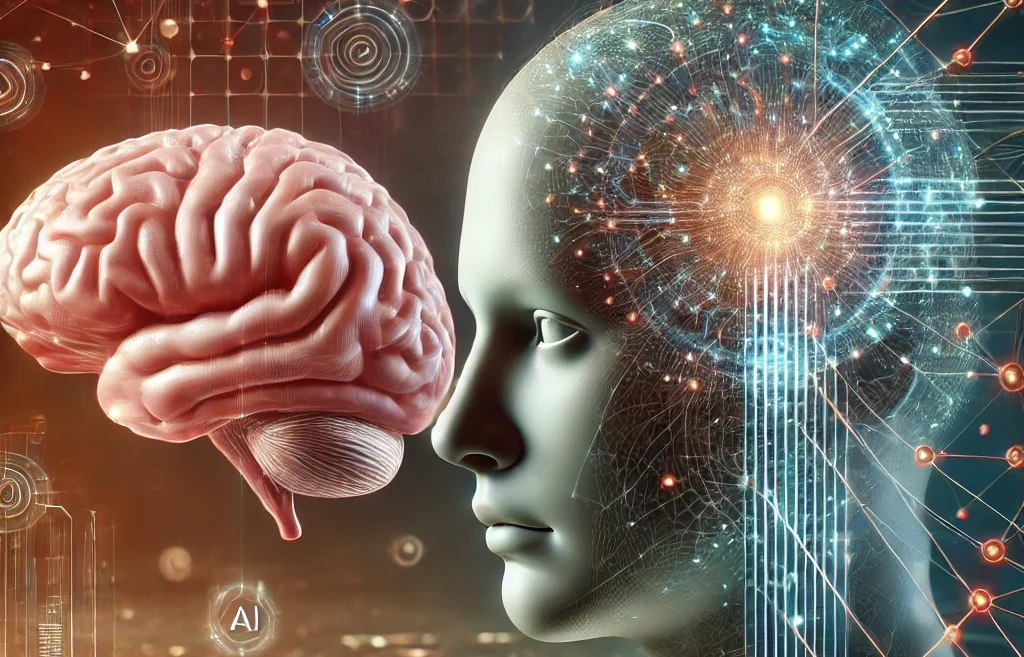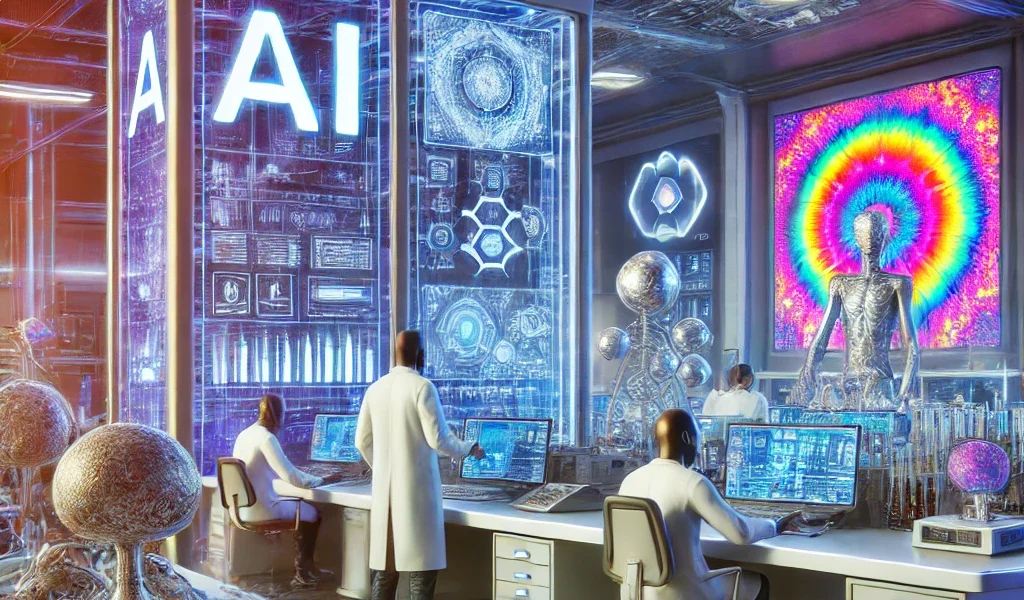In recent years, psilocybin, the psychoactive compound found in certain mushrooms, has gained renewed interest for its potential therapeutic benefits and its impact on human cognition. Historically used in religious and spiritual ceremonies by indigenous cultures, psilocybin has a long history of altering perception and enhancing consciousness. Meanwhile, artificial intelligence (AI) continues to advance at a rapid pace, influencing various aspects of our lives, from automating routine tasks to making groundbreaking discoveries. This blog explores the speculative yet fascinating intersection between psilocybin and AI, examining how insights from psychedelic research could inspire and enhance the development of AI technologies.
Understanding psilocybin’s effects on the brain

Psilocybin has been shown to significantly alter brain function, primarily by interacting with serotonin receptors. This interaction leads to a disruption of the brain’s default mode network (DMN), which is responsible for maintaining our sense of self and habitual patterns of thinking. When the DMN is disrupted, the brain enters a more flexible state, allowing for enhanced creativity, novel problem-solving, and a sense of interconnectedness.
Key scientific findings:
- Neuroplasticity: Studies have demonstrated that psilocybin can increase neuroplasticity, the brain’s ability to reorganize itself by forming new neural connections. This can lead to improved cognitive flexibility and creative thinking.
- Default mode network disruption: Research by Carhart-Harris et al. (2012) showed that psilocybin reduces activity in the DMN, resulting in a state of “ego dissolution” and increased connectivity between previously segregated brain regions.
- Enhanced creativity: A study by Prochazkova et al. (2018) found that microdoses of psilocybin can enhance both convergent and divergent thinking, key components of creativity.
These effects of psilocybin on the brain suggest that it could serve as a model for developing AI systems capable of more creative and flexible problem-solving. For example, psilocybin’s impact on neuroplasticity could inspire AI algorithms that adapt and learn in more human-like ways.
Speculative connections between psilocybin and AI
The unique cognitive states induced by psilocybin offer intriguing possibilities for AI development. By understanding and modeling these states, researchers could develop AI systems that mimic human creativity and innovation.
Hypotheses and scenarios:
- Psilocybin-inspired algorithms: Algorithms designed to emulate the neural connectivity patterns observed during psilocybin experiences could enhance AI’s ability to think creatively and solve complex problems.
- AI creativity boost: AI systems could be trained on data derived from human subjects under the influence of psilocybin, potentially learning new patterns of thinking and problem-solving.
- Interdisciplinary research: Collaborative efforts between neuroscientists, AI researchers, and psychologists could lead to breakthroughs in understanding how psilocybin-induced cognitive states can inform AI design.
For example, an AI designed to solve a novel engineering problem might benefit from algorithms that simulate the brain’s state during a psilocybin trip, exploring unconventional solutions and creative approaches. Similarly, AI systems used in creative fields such as music and art could generate more innovative and original works by incorporating psilocybin-inspired neural patterns.

Potential benefits for AI development
The integration of psilocybin research into AI development could lead to several significant benefits:
- Enhanced problem-solving capabilities:
- AI systems could be better equipped to tackle complex, multi-faceted problems by adopting flexible and creative approaches inspired by psilocybin-induced states. For example, AI used in scientific research could propose novel hypotheses and experimental designs by thinking outside conventional frameworks.
- Improved human-AI collaboration:
- Understanding psilocybin’s effects on the human brain can help create AI that works more intuitively with humans, enhancing collaborative efforts in fields such as art, science, and technology. AI systems that understand and emulate human creativity can work alongside researchers and artists to push the boundaries of innovation.
- Innovative applications:
- Psilocybin-enhanced AI could lead to breakthroughs in various domains, from generating original works of art to discovering novel scientific theories and technological innovations. For instance, a creative AI artist might produce more innovative and boundary-pushing pieces by incorporating psilocybin-inspired algorithms into its creative process.
For instance, AI systems used in creative industries could generate unique and inspiring artworks, music compositions, and literary works, enriching our cultural landscape. In scientific research, AI could assist in making groundbreaking discoveries by proposing unconventional solutions to complex problems.
Future directions and research
As the fields of psilocybin research and AI development continue to evolve, there are exciting opportunities for interdisciplinary collaboration and innovation.
Current and upcoming research:
- Neuroscientific studies: Ongoing research into the effects of psilocybin on brain function and cognition.
- AI experimentation: Pilot projects exploring the integration of psilocybin-inspired algorithms into AI systems.
Ethical frameworks: Development of ethical guidelines for conducting and applying research at the intersection of psychedelics and AI.
Potential collaborations:
- Interdisciplinary teams: Bringing together experts from neuroscience, AI, psychology, and ethics to explore the potential of psilocybin-inspired AI.
- Public engagement: Involving the public in discussions about the ethical and societal implications of this emerging field.
For instance, universities and research institutions could host symposiums and workshops to foster collaboration and dialogue among experts from various disciplines. These events could serve as platforms for sharing research findings, discussing ethical considerations, and exploring innovative applications.
Conclusion
The intersection of psilocybin and AI represents a speculative yet promising frontier for technological and cognitive innovation. By exploring how psilocybin influences human creativity and problem-solving, researchers can gain valuable insights that could inspire the next generation of AI technologies. While there are significant ethical and practical challenges to address, the potential benefits of psilocybin-enhanced AI are vast, ranging from improved problem-solving capabilities to innovative applications in art, science, and beyond.




